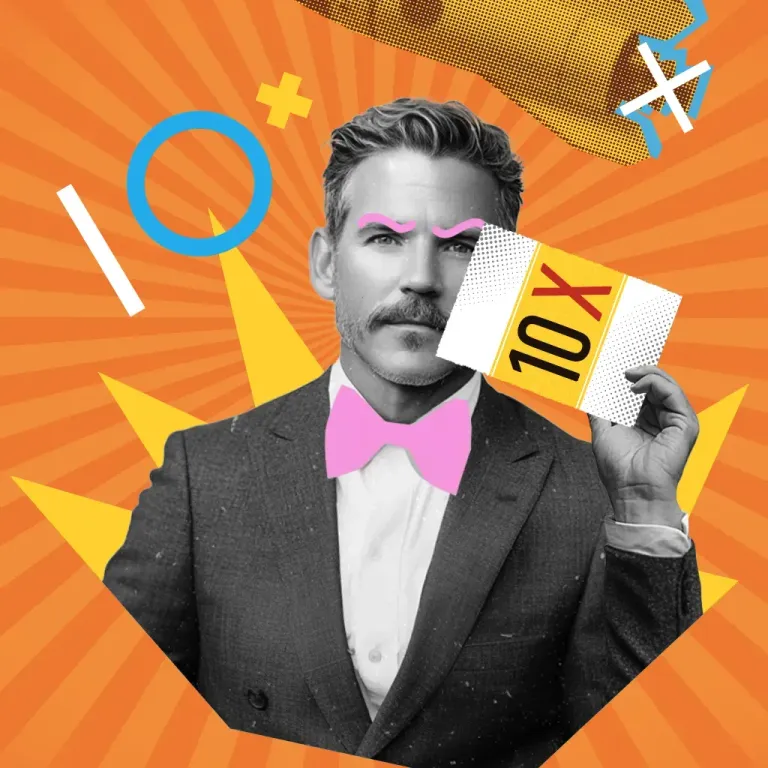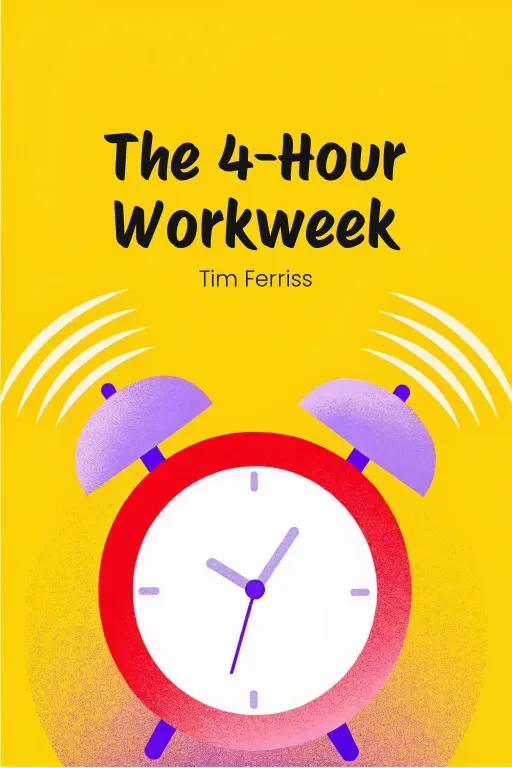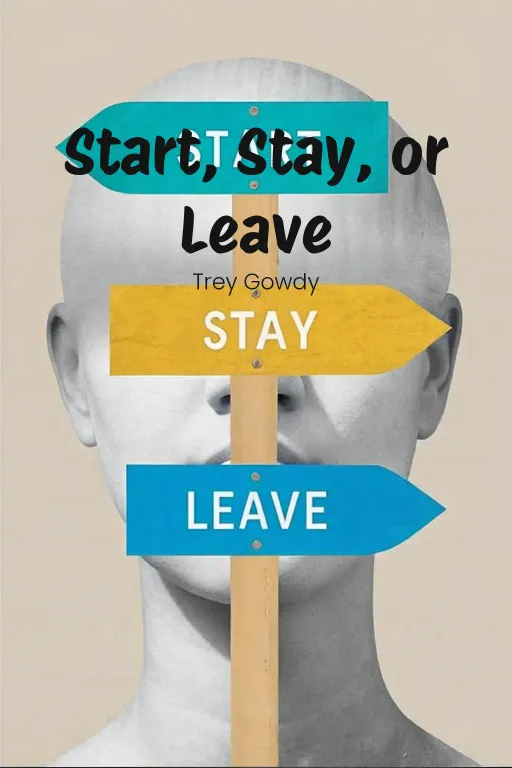
Unleash Your Hidden Potential: 10X Results Now
Podcast by Let's Talk Money with Sophia and Daniel
The Only Difference Between Success and Failure
Unleash Your Hidden Potential: 10X Results Now
Part 1
Daniel: Hey everyone, welcome back to the show! Ever wonder why some people just seem to crush it while the rest of us are, well, comfortably coasting? Today, we’re diving into “The 10X Rule” by Grant Cardone. It’s all about unlocking that extra gear we didn't even know we had! Sophia: Coasting, huh? Daniel, you make it sound so… uninspired. So, are we talking about turning my life up to eleven here? Because if this involves sacrificing my precious downtime, I'm already skeptical. Daniel: Not exactly, Sophia, but it is about thinking and acting way bigger than you probably are right now. Cardone basically throws the idea of "average" out the window. He's all about taking massive action – not just to hit your goals, but to obliterate them. It’s a pretty bold push to ditch the excuses, harness your fears, and own your success, big time. Sophia: Obliterate, eh? Now you're talking my language! So, what's the game plan here? Are we doing a full Cardone deep-dive, or just picking apart his whole “10X everything” idea? Daniel: A bit of both. First, we’ll get into the core message. Think of it as setting the stage. It's all about getting the right mindset for seriously big success. Then, we’ll talk action, like taking that massive action and ditching that average mindset. Then we'll unpack the "gear" for keeping things moving, and finally, how to build something that lasts and keeps growing. Sophia: So, we’re summiting some metaphorical Mount Everest of ambition? Fine, I’m game. But I’m gonna be the voice of reason here, pointing out where this “10X” thing might just crash and burn in the real world. Daniel: Alright, fair enough! Let’s see if we can convince you that massive action is the way to go. Let’s dive in!
The 10X Rule Concept
Part 2
Daniel: Okay, so the core of “The 10X Rule” is about radical goal-setting combined with taking massive action. You set goals that are ten times bigger than you'd normally aim for, and then you take ten times the actions you think are necessary. It’s about changing your perception and matching that ambition with relentless effort. Sophia: So it's “dream bigger, work harder,” but fancier? I mean, haven't we all heard that before? Big swings, aim for the stars—but what's Cardone’s unique take? Daniel: Well, he argues that most people fail not because they can't, but because they underestimate the effort and the obstacles. We chase these incremental goals and then fall short because we aren't properly prepared. Sophia: Okay, but does everyone need to aim for extraordinary success? What if someone's happy with paying the bills and enjoying life? Maybe not everybody needs Cardone-level domination. Daniel: Right, but he’d say that even if you’re happy with “enough,” aiming for 10X makes it way more likely you’ll actually meet—or even exceed—your goals. It’s to combat complacency. If you want to double your income, you might make small changes. But what if those fall flat? You’re underprepared. Sophia: Right, but if I'm aiming for ten times my income, I'm building systems, scaling skills, and creating multiple income streams. Whole different ballgame. Daniel: Exactly! You take actions that are robust enough to counter problems. He says when he was struggling in sales, instead of a few clients, he aimed to dominate the whole market. That changed everything. Sophia: Alright, I’ll give him that. If you think “10 calls are enough,” you'll hit five and quit. But if you aim for fifty, even thirty-five looks good. Daniel: Exactly. And that’s where massive action comes in. It’s about doing enough to account for setbacks. When launching a business, we take safe steps, but under the 10X Rule, you'd max everything out—large marketing, partnerships—to hit the ground running. Sophia: But that sounds exhausting, right? Can anyone keep that up? Daniel: That’s where mindset comes in. It's more than just tactics, it’s a deep reset. Success isn’t optional, it’s a necessity. No excuses, no blaming the economy. If you treat obstacles as reasons to amplify your effort, you rewire how you approach challenges. Sophia: If you’re "amplifying" every curveball, are you running on fumes? Resilience isn't burnout, and I worry he's blurring that line. Daniel: Good point! But he’s not talking mindless effort; he’s talking calibrated intensity. You focus on high-impact actions that drive results, not busywork. People burn out working ineffectively, without clear direction. Sophia: So, not just grinding, but grinding strategically. I imagine him walking into a room chanting “No excuses! Dominate!” like some business gladiator. Daniel: He is a "take-no-prisoners" type. But really, Sophia, some of the most successful people—like Elon Musk or Richard Branson—they’ve embodied this mindset. Musk didn’t incrementally build an “okay electric car,” he wanted to revolutionize the entire auto industry. That audacity, paired with relentless action, makes the impossible possible. Sophia: Fair enough. But I'm still stuck on "10X everything." What if I set big goals and miss? Are we setting ourselves up for failure? Daniel: Right. But Cardone believes aiming high and pursuing massive action creates opportunities you wouldn't have otherwise. Even if you miss, you’re likely to land far ahead of “achievable” goals. It’s about creating a ripple effect. Sophia: Alright, so it’s less “all-or-nothing,” and more “shoot for the moon, and if you miss, there's still a whole patch of stars waiting.” Intriguing. Keep going.
Massive Action and Domination Over Competition
Part 3
Daniel: So, after laying the groundwork for the 10X Rule, it’s essential to understand how critical this approach is across life and business. Massive action and domination? They’re not just catchy phrases, but fundamental to achieving lasting success. We'll build on that 10X foundation and delve into practical execution and strategic positioning to attain exceptional outcomes. Sophia: Okay, we’re shifting gears from theory to practice, which is great. But let’s get something straight right away. When you say “domination,” are we just talking about outperforming the competition, or does this mean a zero-sum game where someone else has to lose for you to win? Daniel: Good question. Cardone’s version of domination isn't about tearing others down, but about redefining the entire game. You avoid focusing on marginal gains or simply beating competitors by their own rules. Instead, you innovate and create such distinctive value that you're essentially playing on a different level. Think of Apple dominating the tech world; not by being cheaper, but by completely changing what people expect from a tech product. Sophia: So, “rise above,” rather than “battle it out.” Does this tie into the concept of massive action? Like, instead of just grabbing a slice of the pie, you bake a completely new, bigger pie? Daniel: Exactly. And massive action is the means to do that. It’s not just about putting in effort; it's about relentless, focused effort that goes far beyond expectations. Cardone’s story is a great example. Early on, he thought a few sales calls daily would suffice. He quickly realized this led to mediocrity. So, he ramped it up to 20, even 30 calls a day. That level of activity transformed his results. Old opportunities revived, and entirely new ones arose. Sophia: Wait a minute, 30 calls a day? That’s not just effort; it’s insane! Did he even sleep, or was he just fueled by caffeine and ambition? Daniel: This intensity wasn't random, it was calculated. Cardone emphasizes that "the more doors you knock on, the more opportunities you uncover." It's not just a numbers game, though. The core idea is that taking expansive action creates momentum. He saw better results because he was doing more, but also, he was prepared for the inevitable setbacks. That’s what’s so powerful. When obstacles come, you’ve already built the energy and systems to break through. Sophia: So, massive action is like insurance against the world trying to slow you down. But if Cardone’s insurance premium is 30 calls a day, I’m scared to imagine his idea of “normal effort." Daniel: Well, normal effort is the issue, isn’t it? Cardone says average efforts lead to average results, and worse, when things get tough, you might not even get those! With massive action, you essentially remove the possibility of failure. You're not just playing to compete; you’re playing to dominate. Sophia: Which brings me back to "dominating the competition." It feels a bit unsettling, almost Darwinian. What about the idea of a healthy market where everyone thrives? Daniel: Cardone argues "healthy competition" is an illusion. Instead of competing in a crowded space, aim to eliminate mediocrity and set yourself apart so sharply that you become the standard. A great example is his approach to sales innovation: "Information-Assisted Selling." Instead of using outdated scripts or pressure tactics, he focused on giving buyers exceptional, tailored information. It wasn’t just selling; it was creating an unmatched customer experience. Sophia: So, while everyone else was playing checkers, he invited customers to play chess against a grandmaster. Sneaky, but I see the brilliance of bucking the trend to stand out. Daniel: Exactly. When you combine that with massive action, competing with you seems impossible. It’s not about beating others at the same game, it’s about becoming the game-changer. Sophia: Alright, I’ll concede that “domination” might be less cutthroat than it sounds. But, how practical is this for the average person? What if I can't build some Tesla-level empire? How can I use this without being constantly stressed? Daniel: The good news is, domination doesn’t require a billion-dollar brand. It’s scalable. Cardone provides tools to make it achievable. Relentless innovation, finding ways to stand out. But it doesn’t stop there; visibility is essential. Being excellent isn’t enough; people need to see and recognize your excellence. Cardone, for example, mastered social media, becoming impossible to overlook. Sophia: So, step one is “be amazing,” and step two is “shout it from the rooftops.” Got it. But what about balance? How do you amplify without being obnoxious—or overselling your capabilities? Daniel: That’s where overcommitment and overdelivery come in. Cardone makes it clear: don’t just talk the talk, walk the walk. If you promise tenfold value, you have to not only meet but exceed that promise. Your reputation transforms in the follow-through, not just in the visibility stage. Sophia: Okay, so beyond charisma, there’s substance. Overdelivering leaves no room to doubt you. Honestly, that resonates, especially in industries where competitors barely clear the bar. Daniel: Precisely. Think of Howard Schultz and Starbucks. During economic downturns, others retreated or cut costs, but Schultz doubled down. He visited stores, enhanced the customer experience, and expanded the product line. By taking extraordinary action when others hesitated, Starbucks didn’t just survive—it became the gold standard. That’s domination with massive action. Sophia: Alright, so we’re talking focus, persistence, innovation, and commitment to undeniable value. I hate to admit it, but maybe I’m starting to see the appeal of this strategy, at least when used responsibly. Let’s continue.
Mindset Shifts: Fear, Obsession, and Responsibility
Part 4
Daniel: So, with the groundwork laid on action and domination, Cardone then pivots to the mindset needed to keep that level of performance going. He gets into the psychology of success — how fear, obsession, and responsibility aren't just feelings, but strategic tools. It’s really a deep dive into the inner transformation you need to back up all the massive external actions we’ve been talking about. Sophia: Okay, now we’re getting into the real battle, the mental game you need to play to keep the whole 10X machine humming. Daniel, where do we start? What’s his big idea here? Daniel: Well, the first big shift is how he wants us to see fear. Most people run from it, right? They avoid it or let it freeze them. But Cardone sees it totally differently: he says fear is actually a signal, telling you where the growth opportunities are. If you're not feeling fear, in his opinion, you’re not aiming high enough. Sophia: Huh. That’s definitely not how most people see it. Fear as a guide? It’s like saying, "This looks dangerous, that must be the right way forward!" So, how does he turn that into something useful? Daniel: Right, so Cardone basically argues that fear pops up when you're about to push past your comfort zone, that’s all. He shares stories from his own life, like the fear he felt before making some really big investments or starting new businesses. But instead of backing down, he says he acted fast. His thinking is, the longer you wait, the worse the fear gets, so the best thing to do is just jump in. Sophia: Okay, "jump in" sounds great, but what if the fear isn't just about making a phone call but something really big, like risking your entire financial life on one investment? Daniel: That's where his second tactic comes in: he wants you to reframe the fear. Instead of thinking about the worst that could happen, he says, picture the best. Basically, he’s flipping the equation in your head. Instead of "What if I fail?" you ask, "What could I gain from this?" The idea is to turn that fear into excitement. Sophia: Hmm. That’s almost like a Jedi mind trick, but I can see the value. It’s a little like stage fright—you turn it into adrenaline. But isn’t fear sometimes a real warning? Like, "Don't touch that, it's hot!" Where do you draw the line between useful fear and just plain recklessness? Daniel: Right, and that’s where he says preparation comes in. Cardone isn't saying be reckless. He wants you to act big, yes, but also act smart, with good information. He talks about building up your confidence by remembering times you faced fear and won. Every time you remind yourself that you’ve handled fear before, you’re building up a mental record that says you can handle it again. Sophia: So, fear isn’t the enemy, it’s like a test for growth? Face it head-on, but make sure you've done your homework and know what you're getting into. Alright, fear is off the hook. What's next? Daniel: Obsession. Cardone says that we need to see it as a gift, not a flaw. Most people think “obsession” and they think something unhealthy. But he says it's that super-focused intensity that drives really big success. Sophia: Oh, here comes the Steve Jobs story, right? Daniel: Exactly! Cardone points to Steve Jobs as the perfect example of productive obsession. Jobs wasn't just trying to make cool stuff; he was obsessed with making everything seamless and easy to use. Every little thing mattered, from how heavy the iPhone felt to the design of the packaging. That’s the kind of focus that made Apple a giant. Sophia: Okay, Jobs gets the credit... grudgingly, from me, as a former PC user. But what does Cardone actually say about developing a healthy obsession? Because, let’s be honest, obsession can easily turn into burnout or losing sight of everything else. Daniel: He’s got a few tips. First, he says, make your goals public. When you tell people what you're aiming for, you’re not just making yourself accountable, you’re also backing up your commitment. It’s like creating pressure to get it done. And then he suggests total immersion—blending your goals into everything you do. That means always learning, practicing, and taking action. Sophia: Public accountability – interesting. Though I can see how announcing, “I’m going to dominate my industry” might make for awkward dinner conversations. So what’s his follow-up to avoid turning into a crazy person? Daniel: Balance, but he defines it differently. For Cardone, balance isn’t about cutting back, it’s about making sure your obsession gets you positive results, both at work and in your personal life. Healthy obsession means making progress while still taking care of the other important stuff, like relationships or staying healthy. Sophia: Got it—obsession as a tool, not a sacrifice. Go after your goals hard, but don't destroy everything else around you. Okay, what’s the third key to staying sane while pursuing 10X? Daniel: Responsibility. Cardone says you can't negotiate this one. Taking full responsibility for everything that happens, good or bad, is the ultimate power move. If you blame the economy, or bad timing, or anyone else, you’re giving up control. But when you own your results, you’re always in charge. Sophia: That sounds great in theory, but come on. Sometimes things really are out of your hands — like a recession or a natural disaster. He can’t expect us to take responsibility for those things, can he? Daniel: He's careful to distinguish between blaming outside forces and actually doing something about it. It’s not about pretending those things don't exist, it’s about refusing to let them control you. Like, during the economic downturn, instead of complaining about the market, Cardone doubled down on what he could control, like reaching out to more customers. His business didn't just survive, it actually got better. Sophia: So it’s not about denying reality, it’s about shifting gears and dealing with it. I see how that builds momentum — finding what you can control and pushing forward. Any tips for making that kind of accountability a habit? Daniel: He’s got a few. Start with daily self-reflection—constantly asking yourself what you could have done better. He also wants you to cut out excuses completely. Every time you catch yourself saying, "But X happened," change it to, "Here's how I'll adapt." And, maybe most important, reframe setbacks as lessons. See every mistake as something valuable you can learn from, not a dead end. Sophia: I like that “reframe” idea. I’ve definitely messed up before and come out stronger for it, even if it's easier to say that looking back. What about criticism? I’m sure people shooting for 10X goals get plenty of haters. Daniel: Definitely, and Cardone says criticism is not only unavoidable but a sign that you're getting noticed. If nobody's criticizing you, he says, you're probably not making enough of a splash. For example, his aggressive sales tactics used to get criticized for being over the top. But those same methods are now seen as game-changing. Sophia: So criticism is less “I suck” and more “I'm being seen.” You just have to be tough enough to sort out the useful feedback from the noise. Any final thoughts before we wrap this up? Daniel: The main message here is empowerment. Fear, obsession, and responsibility—he’s reframing all of them as strengths, not weaknesses. These mindset shifts are supposed to help you spot opportunities, stay focused on your goals, and take ownership of everything you do. Together, they’re the mental foundation that makes massive action not only possible but, in his view, inevitable. Sophia: More tools for the ambition toolkit. Alright, let’s keep climbing this 10X mountain. What’s next on the agenda?
Practical Strategies for Implementation
Part 5
Daniel: Okay, so we've got the mindset down. Now, how do we actually put this into practice? Theory's great, but Cardone doesn’t just leave us hanging with abstract ideas. He’s got a really concrete approach to making this 10X thing actionable. It’s not just about trying harder, it's about being specific and scaling up. Sophia: Exactly, Daniel. How do we apply this ambitious view into our lives without seeming absurd? Give me something I can use today. Daniel: Let’s start with the core: setting 10X goals. It's not about small steps or "safe" targets. It's about pushing yourself to think and act on a scale that's ten times bigger than what you think you can achieve. Sophia: So, instead of aiming for a 10% sales increase, we're talking 100%? I don’t want to sound cynical, but doesn't that invite potential disappointment? Daniel: I know it sounds a bit crazy, but listen to this. Cardone says that setting huge goals changes how you think. When you go for 10X, you start taking actions that match that level. You build systems, find partners, and see chances you’d miss with smaller goals. He talks about his real estate. He first wanted 500 properties and then he aimed for 5,000. That big change forced him to completely rethink his strategy. Sophia: So, 10X goals shift your strategy, not just your effort. How do you set goals like that? Do you just take your dreams and multiply them by ten? Daniel: Not exactly. He suggests writing your goals daily as if they’ve already happened. Instead of saying, “I want to grow my startup,” tell yourself, “I run a globally recognized brand.” This re-wires your brain to see the goal as inevitable. Then, break those huge goals into smaller, still ambitious, steps. If you want 10X revenue, what are the milestones at 2X, 5X, etcetera? Sophia: Breaking the goal into sprints sounds better than trying to jump to the finish line. But won’t focusing on such a big goal make you lose sight of quality or reality? Daniel: That’s where his next strategy comes in: prioritize getting new customers over just keeping the ones you have happy. This can be controversial. Cardone says that while customer satisfaction is important, continuously growing your customer base is more critical as it makes long-term sustainability. Sophia: I can already hear the customer service people complaining. So, it’s less about loyalty, more about getting as many people as possible? Daniel: Not exactly. It's not about ignoring current customers, but about making expansion the main key to success. Think about the rapid growth of McDonald’s. They didn’t just rely on repeat customers. They launched marketing and changed menus to attract different people. That’s how they grew into a huge global operation. Sophia: Brings more people into your world, and happy customers will follow. Wouldn’t alienating your existing customer base be a risk though? Daniel: Cardone would argue that growth is more important than stagnation, even if there are risks. Besides, how you handle growth can improve your service to current customers. For instance, he recommends referral programs, where current clients find new ones for you. It benefits everyone. Sophia: Referral programs, got it. But this uses time, energy, and money. How do you keep things running while doing this? Daniel: That’s where you rethink your thinking on time management and start thinking about high-impact tasks. Traditional time management focuses on fitting more into a fixed time. Cardone says to forget that. Focus only on tasks that directly help you reach your biggest goals. Sophia: Fewer to-do's and more effective execution. I like that. What’s one high-impact task? Daniel: Cardone often refers to cold calling. Instead of going for “a few” calls a day, he would aim for 20-30 daily calls. That might sound exhausting, but just think about the result. More calls meant more leads, more opportunities to close, and eventually, a higher bottom line. It wasn’t about keeping busy, it was about maximizing outcomes. Sophia: Got it. So, instead of doing "busy work" like sorting emails, you focus on calls or pitches that drive results. Makes sense, although ramping up to 30 calls a day sounds tough. Daniel: That’s where batching tasks and delegating comes in. Cardone recommends you identify the low value tasks, like admin or inbox management, and offload them as much as possible. If you can master being laser-focused on your high-impact objectives, you can avoid the time-consuming distractions. Sophia: The classic "work smarter, not harder," though in Cardone's world, it's more like "work harder on the smarter stuff." So far, so good. What’s next? Daniel: His fourth key factor is expanding during downturns, and this is huge. Most people pull back during crises such as cut funding, reduce activity, and play it safe. Cardone recommends the opposite: when everyone else is retreating, that’s when you have an opportunity to grow. Sophia: Wait, you’re telling me to invest when things are falling apart? That sounds…risky. Daniel: It does, but that’s where the advantage lies. Think of Starbucks during the 2008 recession. While competitors cut costs, Howard Schultz invested in mobile apps, new products, and connecting with customers. By growing when others were shrinking, Starbucks regained control and made a way to succeed during hard times. Sophia: So, you go against the crowd, taking risks when others hold back. But what if the downturn lasts longer than your expansion? Doesn’t everything fall apart? Daniel: It’s not about being blindly aggressive, it’s about using opportunities others miss. Marketing costs, for instance, often drop during crises, so you can reach more people for less. And, you strengthen your operations, so you can take advantage when things get better. Sophia: Training yourself to see crises as positive… that feels like a fantastic skill if you can master it. Okay, and what is your last strategy? Daniel: Omnipresence. Cardone says this means being impossible to ignore. Whether it’s your brand, product, or yourself, omnipresence ensures everyone sees you everywhere. Sophia: Let me guess—this involves social media, right? Nonstop posts, hashtags, and stories? Daniel: Exactly, but it’s more than just being active. Cardone stresses consistent, quality content across multiple platforms. He calls it “content first,” meaning every blog, video, or post supports your main vision and helps your audience. Sophia: Makes sense. Although posting three times a day sounds exhausting—how can anyone support that? Daniel: Repurposing content. One webinar becomes YouTube clips, podcast episodes, and Instagram stories. You can create a lasting presence without reinventing something every time. Add to that, direct audience engagement—comment replies, DMs, even live Q&A events—and you create a network that feels personal, not just constant. Sophia: Exposure meets value. It’s not just speaking into the void, but connecting with your audience. Honestly, this might be my favorite strategy - it feels as relevant for a personal project as it does for world domination. Daniel: That’s what makes Cardone’s methods great. It can be scaled and used by anyone. From setting huge goals as you being omnipresent, he’s providing strategies that don’t just apply to business, they’re a framework for any area of life you want to change. Sophia: Well, I’m intrigued. These strategies feel like life hacks for people with great goals - a guide to going from good to amazing. Keep showing me what is next.
Sustainable Success and Legacy
Part 6
Daniel: So, to wrap things up, we've talked about how these strategies lead to long-term success and, ultimately, leaving a legacy. This is really where everything comes together – how do we make the “10X Rule” create a lasting impact? How do you go from just achieving things to building a legacy that influences people for years, even generations? Sophia: Ah, so we've arrived at the ultimate goal: it's not just about getting to the top, but building a monument that lasts. Before we dive in, what exactly does Cardone mean by “sustainable success”? Because, let's be honest, some of his methods sound like intense bursts of energy rather than something you can realistically keep up to build something truly “sustainable.” Daniel: That’s a really insightful question, Sophia. For Cardone, sustainable success isn't about staying still, it's about constantly growing, adapting, and taking action to ensure success never plateaus. He's a big believer that complacency is the death of sustainability. Think of it this way: success is like a fire. It needs constant fuel, new ideas, and effort to keep burning bright. If you stop acting, the momentum dies down, and you lose your ability to grow or even keep what you've already achieved. Sophia: Okay, so it's not about taking it easy once you've made it; it's about actively fueling the fire. But is there a point where you just can't keep going? Can someone really maintain that level of intensity without eventually burning out? Daniel: Cardone tackles that by emphasizing leverage: using systems, empowering teams, and multiplying your resources so growth isn't all on you. Keeping the momentum going means setting up structures that support ongoing action. For instance, after you hit a big goal, instead of relaxing, you put that success back into new goals or innovations. He actually learned this the hard way. Early on, he took a break to enjoy one of his successes, and he realized his drive was fading and opportunities were shrinking. It was a wake-up call: success isn’t a destination; it’s a habit. Sophia: So, the reward for achieving something is... more work towards the next thing? I think some listeners might be groaning right now. Is there any room for celebration in the 10X lifestyle? Daniel: Of course! But celebrating doesn’t mean slowing down. Cardone believes in acknowledging your wins, but then using that energy to jump into the next challenge. It’s about staying hungry, not letting your achievements limit you. He even suggests setting new goals while you're pursuing others, so you always have a direction. Sophia: Got it – a rolling stone gathers no moss. But let's talk about fail-safes. How do you prevent burnout when you're constantly pushing forward like this? Daniel: That's where the idea of scaled massive action is key. It's all about working smarter and building systems to multiply your efforts. Cardone talks about things like automation, delegation, and partnerships to handle the heavy lifting. Also, focusing on what really matters and avoiding time-wasting tasks can really reduce stress. Basically, you're building a machine that keeps running, even when you're not constantly manning the controls. Sophia: Okay, that's starting to sound more realistic. So, sustainability isn't about avoiding effort; it's about managing it and creating systems that keep you moving. But what about legacy? Let’s talk about building something that lasts. How does Cardone define that, and how do you go about pursuing it? Daniel: For Cardone, legacy is about going beyond your own success and building something that impacts others long after you're gone. It’s about using your influence, visibility, and accomplishments to make a lasting mark – whether on your industry, your community, or even the world. It’s not just about money; it's about setting standards, inspiring people, and changing what's possible. Sophia: It's not just about putting your name on a building, but becoming an idea that lives on. Like a movement – Elon Musk and electric vehicles, for example Give me a real-world example of what Cardone means by legacy. Daniel: A great example is Howard Schultz and Starbucks. He didn't just make Starbucks a profitable company; he changed the whole coffeehouse experience, made social responsibility a business practice, and expanded globally in a way that left a lasting impact on the industry. Even today, Starbucks is more than just a coffee brand; it's a cultural icon that changed how people socialize and work. That’s legacy in action! Sophia: That’s impressive, but what about the rest of us? How can someone without a boardroom and a billion-dollar budget even start thinking about leaving a legacy? Daniel: It starts with influence, no matter how small. Cardone talks about three key things: sharing knowledge, thinking big, and staying visible. By teaching and mentoring, you're already shaping the world around you. Whether you’re sharing your expertise or helping your team grow, you’re planting seeds for the future. Thinking big expands that potential – if your business or project solves real problems, it will likely have a longer-term impact. Sophia: And I’m guessing visibility is about making sure people actually see all that brilliance, right? How do you do that without just looking like you're promoting yourself? Daniel: The trick is to provide value in everything you do. Whether you're speaking at events, writing books, or even just using social media, Cardone emphasizes being present – but in a way that showcases your expertise, not just your face. It's about value-first visibility. People remember those who make a difference. Sophia: Fair enough. But how do you manage this "omnipresence" without it feeling fake? There’s always the chance of creating a persona instead of something real. Daniel: That's why Cardone says legacy-building has to be built on something real. Being everywhere amplifies your work, but it won’t mean anything if you're not making a genuine contribution. Think of it like a spotlight – it makes you visible, but what’s being shown has to be worth seeing. Sophia: Okay, so if you're impactful on a smaller scale, you can amplify that to make a larger impression. Got it. But I'm still worried about the pressure. If legacy requires constant growth and being everywhere, how do you balance that with reality and the fact that things will inevitably slow down at times? Daniel: Cardone sees legacy not as a finish line, but as a continuous contribution – a series of small, intentional, high-value actions over time. Whether you're constantly mentoring, innovating, or creating something that inspires others, legacy isn’t about perfection, it's about persistence. Sophia: So the “10X Rule” isn't just about having success – it’s about stacking those achievements to make real change. You're not thinking short-term; you're building something that lasts. Okay, I get why you're so excited about this. Daniel: Exactly! By keeping your momentum going, overcoming your limits, and focusing on impact, the “10X Rule” turns success into sustainability, and sustainability into a legacy. It’s not about stopping when you reach the top – it’s about using that position to build something even bigger!
Conclusion
Part 7
Daniel: Okay, Sophia, let's bring this home. “The 10X Rule” isn't just a book you read, it’s really a mindset. It's a whole way of thinking and acting, but on a much, much grander scale. Cardone's really pushing us to reset our idea of what success even means, from setting huge goals, taking relentless action, to, you know, actually embracing things like fear and even obsession. Sophia: Right, and it's also about the practical stuff—like focusing on the tasks that give you the biggest bang for your buck, thinking about expanding when everyone else is pulling back, and making sure you are everywhere. These aren't just strategies for CEOs; they're frameworks anyone can use to break through their own limitations, right? Daniel: Absolutely! It's about escaping the average and shooting for something truly amazing. Whether it's your job, your own self-improvement, or even how you want to impact the world, the 10X Rule is really a reminder to dream bigger, act bolder, and never, ever settle. Sophia: So, here’s a thought for our listeners: Where in your life could you crank up the 10X mindset, starting today? Think of a goal that feels just a bit out of reach, multiply it by ten, and then start taking, you know, massive action towards it. Daniel: It won’t necessarily be a walk in the park, but like Cardone says, success isn't optional, it’s really your duty. So let's change how we think about effort and what we're capable of, and see how far we can actually go. Sophia: Alright, listeners—until our next conversation, dare to dream bigger, work smarter, and well, maybe, just maybe, dominate.









